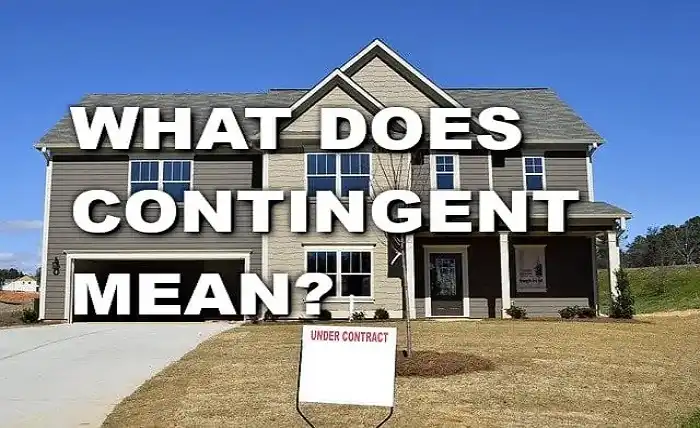What Does Contingent Mean in Real Estate and How Does It Affect Buyers and Sellers?

If you are in the market for buying or selling a home, you may come across the term “contingent” in some listings or offers. But what does it mean and how does it affect the real estate transaction? In this blog post, we will explain what contingent means in real estate, what are the common types of contingencies, and what are the pros and cons of contingent offers for buyers and sellers.
What Is Contingent in Real Estate?
Contingent means “depending on certain circumstances”. In real estate, when a property is listed as contingent, it means that an offer has been made and accepted by the seller, but before the deal is complete, some additional criteria must be met. These criteria are called contingencies, and they are conditions that the buyer or seller can include in the contract to protect themselves from unforeseen issues or risks.
For example, a buyer may make an offer contingent on getting a satisfactory home inspection, appraisal, or loan approval. If the inspection reveals major problems, the appraisal comes in lower than the offer price, or the loan is denied, the buyer can back out of the contract without losing their earnest money deposit. Similarly, a seller may make an offer contingent on finding a new home to buy or closing on another property. If the seller cannot find a suitable home or close on their other deal, they can cancel the contract without penalty.
Contingencies are common in real estate transactions because they allow both parties to have some flexibility and security in case something goes wrong. However, contingencies also come with some drawbacks and risks, as we will discuss later.
What Are the Common Types of Contingencies?
There are many types of contingencies that buyers and sellers can include in their contracts, depending on their specific needs and preferences. However, some of the most common ones are:
- Home inspection contingency: This contingency allows the buyer to have the property inspected by a professional within a certain period of time (usually 10 to 15 days) after the offer is accepted. The buyer can request repairs, negotiate a lower price, or walk away from the deal if the inspection reveals serious defects or issues that are not acceptable to them.
- Appraisal contingency: This contingency allows the buyer to cancel the contract if the property appraises for less than the offer price. The appraisal is an estimate of the property’s value based on its condition, features, location, and comparable sales. The appraisal is usually ordered by the lender to ensure that they are not lending more than the property is worth. If the appraisal comes in low, the buyer can either renegotiate the price with the seller, make up the difference with more cash, or back out of the deal.
- Financing contingency: This contingency allows the buyer to cancel the contract if they cannot obtain a mortgage loan within a certain period of time (usually 30 to 45 days) after the offer is accepted. The buyer must provide proof of preapproval or prequalification from a lender before making an offer, but this does not guarantee that they will get final approval for the loan. The lender may change their terms or deny the loan based on factors such as credit score, income, debt-to-income ratio, employment history, etc. If the buyer cannot secure financing, they can walk away from the deal without losing their earnest money deposit .
- Sale of current home contingency: This contingency allows the buyer to cancel the contract if they cannot sell their current home within a certain period of time (usually 30 to 60 days) after the offer is accepted. The buyer must list their home for sale and show proof of marketing efforts before making an offer on another property. The buyer may also need to provide evidence of equity or funds to cover both mortgages in case their current home does not sell before closing on their new one. If the buyer cannot sell their current home within the specified time frame, they can back out of the deal without penalty .
- Home sale contingency: This contingency allows the seller to cancel the contract if they cannot find and close on another home within a certain period of time (usually 30 to 60 days) after accepting an offer. The seller must actively look for and make offers on other properties before accepting an offer on their current one. The seller may also need to provide proof of funds or financing for their new home. If the seller cannot find and close on another home within the specified time frame, they can back out of the deal without penalty .
What Are the Pros and Cons of Contingent Offers?
Contingent offers have both advantages and disadvantages for buyers and sellers. Here are some of them:
Pros for Buyers
- Contingent offers allow buyers to protect themselves from buying a property that has hidden problems, is overpriced, or is not affordable for them.
- Contingent offers allow buyers to have some flexibility and peace of mind in case their personal or financial situation changes during the transaction.
- Contingent offers allow buyers to avoid losing their earnest money deposit if they have to cancel the contract for a valid reason.
Cons for Buyers
- Contingent offers may make buyers less competitive in a seller’s market, where there are more buyers than sellers and multiple offers are common. Sellers may prefer offers that have fewer or no contingencies, as they indicate a higher level of commitment and certainty from the buyers.
- Contingent offers may delay the closing process, as they require more time and paperwork to fulfill the conditions. Buyers may also face additional costs for inspections, appraisals, and other services related to the contingencies.
- Contingent offers may expose buyers to the risk of losing the property if the seller receives a better offer from another buyer who has fewer or no contingencies. The seller may be able to accept the new offer and terminate the contract with the original buyer, depending on the terms of the contingency clause and the local laws.
Pros for Sellers
- Contingent offers allow sellers to accept an offer from a buyer who is interested in their property, rather than waiting for a perfect offer that may never come.
- Contingent offers allow sellers to have some flexibility and security in case they need to find and close on another home before selling their current one.
- Contingent offers allow sellers to avoid paying two mortgages or renting a temporary place if they sell their current home before buying a new one.
Cons for Sellers
- Contingent offers may make sellers less confident in the deal, as they depend on factors that are beyond their control and may cause the contract to fall through.
- Contingent offers may limit the seller’s ability to market their property and entertain other offers while the contract is contingent. The seller may have to disclose the contingency status to potential buyers and agents, which may reduce the interest and demand for their property.
- Contingent offers may reduce the seller’s bargaining power, as they may have to make concessions or lower their price to accommodate the buyer’s requests or demands related to the contingencies.
Conclusion
Contingent means “depending on certain circumstances” in real estate. When a property is listed as contingent, it means that an offer has been made and accepted by the seller, but before the deal is complete, some additional criteria must be met. These criteria are called contingencies, and they are conditions that the buyer or seller can include in the contract to protect themselves from unforeseen issues or risks.



